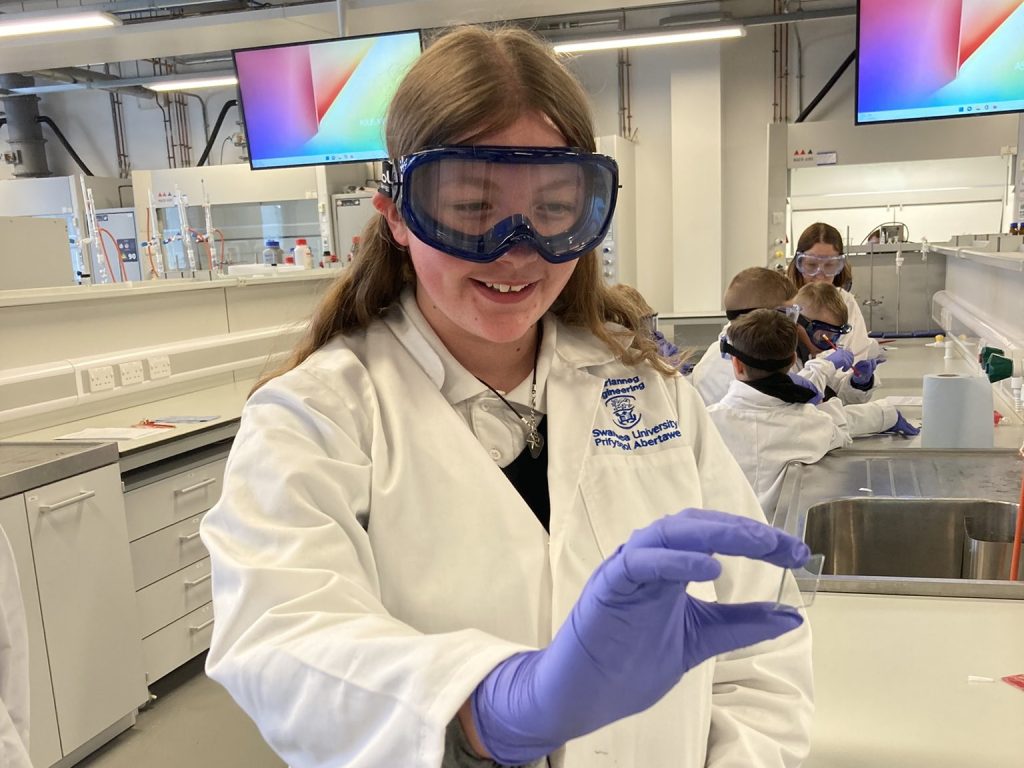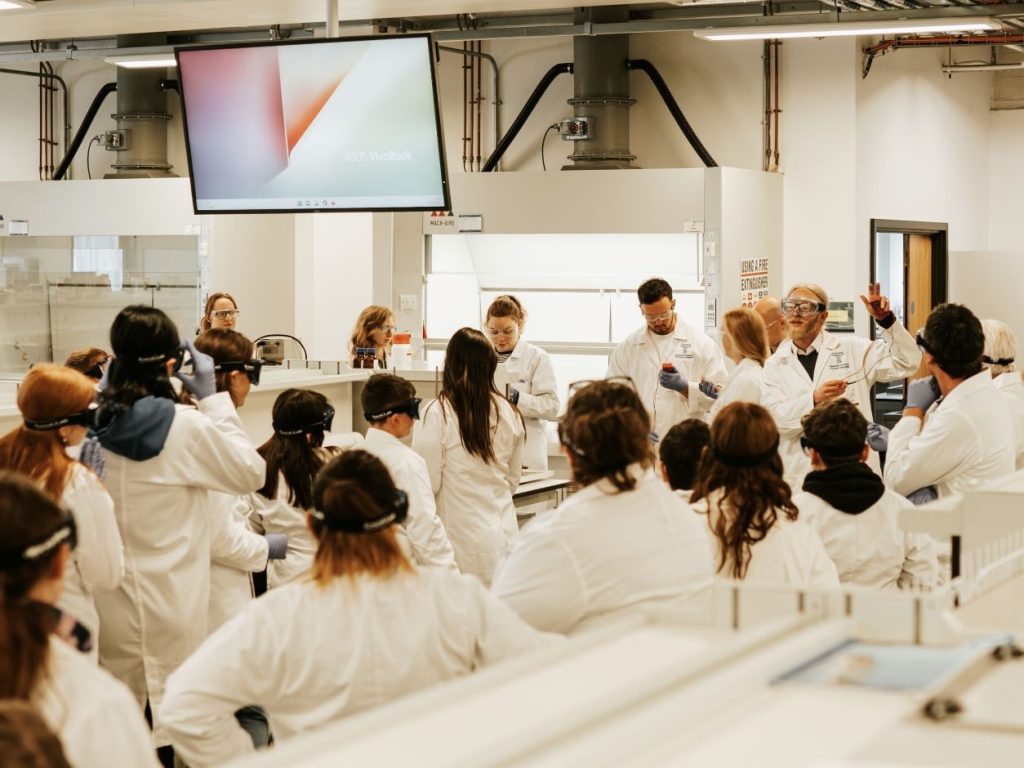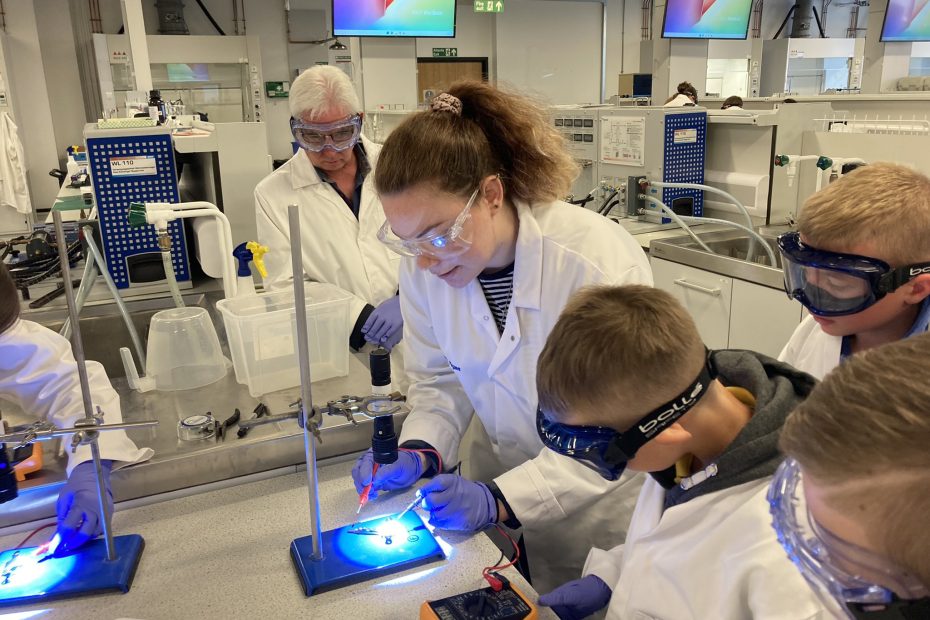SPECIFIC recently had the pleasure of hosting the Energy Warriors conference. Over 50 students from three different schools visited the Swansea University Bay Campus to become renewable energy scientists for the day.
Awel Aman Tawe, a renewable energy charity arranged the visit. They’ve been working with schools across South and West Wales to raise awareness of the importance of clean energy as part of a project called Energy Warriors. The pupils, aged from 10 – 14 from Glyncollen, Morriston and Penyrheol school were welcomed to the Materials Science department at Swansea University.
SPECIFIC were recently honoured to receive the Queens Anniversary Prize for our materials science research leading a revolution in renewable energy technology. As hosting Energy Warriors is our first large in-person outreach session since the pandemic, everyone was keen to get the students excited about our work. After all, some future renewable energy scientists could be sitting in our audience waiting to be inspired!
More Than Something to Keep the Wind and Rain Out
Prof Trystan Watson gave everyone an overview of SPECIFIC’s work. There are over 4 billion square metres of building surfaces in the UK alone. Although they provide shelter from the elements, this is all they do. So SPECIFIC’s research focuses on giving these building surfaces another purpose. We want them to generate, store and release energy captured from the sun. For them to work as one renewable energy system. To turn them into ‘Active Buildings’.
Clean energy is key to moving away from our reliance on fossil fuels. And with enough solar energy falling on the earth each day to power humanity for 27 years, the energy source is there. We just need to harness it.
Solar Fun in the Lab
Dr Rhys Charles took charge of our first practical session of the day – making solar cells using fruit tea! So it was on with our lab coats, gloves and goggles. But which tea made the best solar cell – Very Berry or Blackcurrant? The students used both, then tested and took power readings. The victor – Blackcurrant!
A Global Battery Experiment
Dr Elinor Winrow spoke about the importance of clean energy storage. After that, it was on to our next practical session, making batteries. Students took part in a global battery experiment run by the Royal Society of Chemistry. Groups around the world could log their experiment results and compare stats. So far, over 6000 people have taken part, making over 3000 batteries.
An Active Building In Action
Dr Jo Clarke talked about the Active Buildings she designed. They are a real life example of SPECIFIC’s vision of buildings that generate, store and release their own energy. Students toured the building to see the display board showing energy generated and consumed. They also viewed the batteries in the plant room as well as the solar tubes and the curved photovoltaic roof.
Solar energy also charges up our electric vehicles at the many ports outside the building. In fact, Professor Worsley, founder of SPECIFIC has driven over 40,000 miles in his electric car powered only by the sun!
The day finished with students all receiving certificates for completing their Energy Warriors training. We hope everyone enjoyed being energy research scientists for the day! We’d love for you to come back to Swansea University to study materials science and join our research.
Dan McCallum, MBE, Awel Aman Tawe Managing Director commented,
“With inspiration from staff at SPECIFIC, I think we saw future solar and battery scientists in the making from Swansea schools. It was a great day, brilliantly organised, and I could tell from the buzz around the conference, that pupils and staff learned and gained a huge amount from the day.”
Are You Interested in Free Outreach Sessions?
If you’d like a free materials science session learning about our renewable energy research, Get in touch at materials@swansea.ac.uk. We’re happy to host you at our campus or visit you at your school.
SPECIFIC is funded by the Engineering and Physical Science Research Council and the European Regional Development Fund through the Welsh Government.


